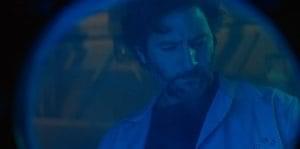
Bringing one’s own biases into a movie, be it the production or viewing of it, is inevitable. A writer may, intentionally or not, bring their ideas of religion or their take on politics into the mix. When handled well, even if the viewer disagrees with the theme, the movie can still strike a chord with the audience. Almost the entirety of Oliver Stone’s filmography is a testament to that fact. Smart dialogue, interesting characters with clear motivations, and stylish directing can get the viewer to at least entertain an opposing viewpoint for two hours. When plot construction is muddled, characters turn on a dime for no reason, and opposing ideology is superficially presented but never explored, the results are a frustrating, confusing mess. That mess is titled Chimera.
Chimera follows scientist Quint (Henry Ian Cusick) who is decoding the DNA of the Turritopsis jellyfish. He is doing this to discover the secret of its immortality and use those findings to cure his dying wife and children of multiple system atrophy, a rare genetic disorder. Thanks to vaguely explained “new laws” acquiring stem cells to study further is quite the ordeal. Therefore, Quint makes a deal with an entitled heiress and multi-millionaire, Masterson (Kathleen Quinlan), who can get anything the scientist needs. The cost is that she’ll be the one publishing the findings but only after Quint can save her deteriorating husband. Getting help from fellow scientist Charlie (Jenna Harrison), Quint must push back against Masterson’s arbitrary deadline and outlandish demands, while trying to ensure his family’s survival.

“…to discover the secret of its immortality and use those findings to cure his dying wife and children…”
The acting across the board is phenomenal. Cusick brings a warmth and intelligence to the scientist in over his head and makes the audience feel his desperation. Harrison brings a vulnerability to Charlie that cleverly masks her real intentions. Whatever aspects of the ending do work, it is solely thanks to the chemistry between her and Cusick. However, the MVP of the movie is Quinlan. She is mesmerizing, intense, and genuinely frightening. Inexplicably creating a compelling antagonist, despite her entire characterization being rich and not giving a crap about any laws.
The sets are not much more than a series of rooms- bedrooms, labs, offices, and other such humdrum places. However, Maurice Haeems, the writer-director, has an immaculate eye, creating dazzling vistas out of small spaces. Utilizing lights and slightly over the top production designs, which are still grounded in reality, the movie is astounding to behold. Crazy camera angles help the audience to get into the mindset of the spiraling Quint in a visually interesting manner.
However, Haeems is far less a distinguished and assured writer. Quint is an interesting fellow, and his reasons for aligning with Masterson make sense, but nothing else does. New laws banning stem cell research, or banning the use of fetuses for such a thing, are given no context, so the audience is confused as to why the governing body in the movie would do such a thing. Equally nonsensical is Masterson’s grand plan of hiring the best mind on the planet, Quint, to finish his research, but refusing him access to the things he needs to do his research. It is as awkward as it sounds. Poor Charlie, though, she gets the worst writing of all the characters. She’s also a scientist, but one more vocal against Quint’s methods, until the end when a secret scheme is revealed. This new plan sees Charlie betray her co-workers, and seemingly her own beliefs.

“…simply having the differing viewpoints flatly stated in the movie is enough.”
Chimera constantly has the characters assert exactly where they stand on every issue that comes up from science versus religion to work versus family to wealth versus barely making ends meet. The ensuing conversations on these topics aren’t discussions, as stating one’s steadfast position rarely leaves room for a debate or exploration of the pros and cons. But Haeems is under the impression that simply having the differing viewpoints flatly stated in the movie is enough. It isn’t, as nobody is swayed one way or the other, nor is there even much of an attempt to get everyone on to the same page.
Chimera is bloody well acted and looks beautiful, but it is all in service of a superficial and didactic story. Thestory believes it is much more nuanced and meaningful than it is. Characterizations make little sense, the pacing is off, and the ending leaves so many more questions than answers.

Chimera (2018) Directed by Maurice Haeems. Written by Maurice Haeems. Starring Henry Ian Cusick, Kathleen Quinlan, Erika Ervin, Jenna Harrison. Chimera screened at the 2018 Phoenix Film Festival.
Grade: D+

